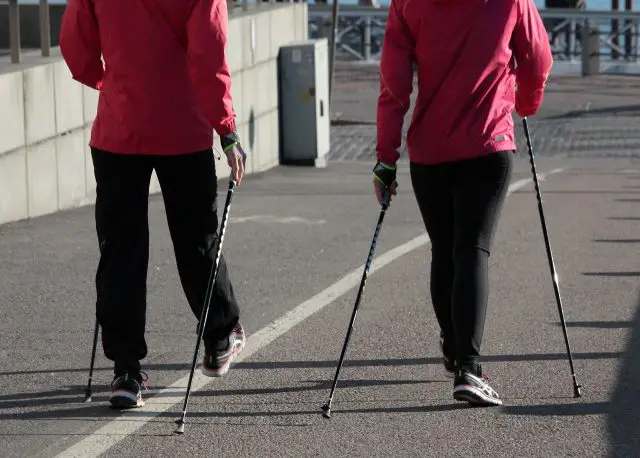In today’s fast-paced, high-tech, and fast food world, it can be incredibly difficult to eat healthy and keep in shape. The Center for Disease Control recommends 150 minutes of moderate exercise weekly, but it is estimated that only 20% of American adults are able to achieve this level of activity. Thankfully, there are many benefits of walking regularly for exercise for all over health and wellness, and some of these many benefits are outlined below.
Benefits of Walking For Weight Loss
- Walking Boosts Metabolism
- Walking Burns Belly Fat
Every living creature depends on their metabolism to chemically break food down into usable fuel for the body. However, when the metabolism does not work effectively, it can be harder to lose weight.
Walking, in conjunction with healthy, clean eating, helps to build lean muscle, and lean muscle helps to speed up metabolism. You can boost your metabolism even more by doing intervals of speed walking or walking and jogging, or doing a walking hill workout.
Walking can help burn fat throughout the body, but can be particularly helpful to get rid of unwanted belly fat.
Doctors suggest maintaining a waist circumference of less than 40 inches for men and less than 35 inches for women, as anything wider than that can indicate a heightened risk of a variety of obesity related disease. The combination of cardiovascular exercise, which helps to lose belly fat, and good posture while on a walk, which builds up abdominal muscles, can help to tone and tighten stomach muscles.

Walking regularly can help you loose weight and get rid of unwanted belly fat
Benefits of Walking For Mental Health
- Walking Boosts Your Mood
- Walking Keeps Your Mind Healthy Into Old Age
We all have our up days and down days, but in the United States today, nearly seven percent of Americans suffer from depression in any given year.
Walking can help to improve mood, relieve depression, and decrease stress levels for a couple of different reasons. The act of doing something good for you, such as exercising, can make you feel good, as does taking walking breaks throughout your work day and getting out in the sunlight, as heightened levels of vitamin D can help boost happiness.
Additionally, walking can decrease levels of cortisone, which plays a huge role in stress levels and boost levels of endorphins in the body. Walking and getting into shape also helps to improve self-esteem.
As we age, many different areas of the body begin to decline, and Alzheimer’s and dementia are among the most debilitating illnesses of the mind.
While the causes of these illnesses are not fully understood, and therefore the prevention methods are not clear either, recent studies have shown that there is potential for walking to help reduce the risk of Alzheimer’s and dementia, as exercise is one of the main ways to keep the brain healthy by protecting existing connections within the brain and promoting new ones.

One of the greatest benefits of walking is boosting your mood
Benefits of the Simplicity of Walking
- Walking Is Cheap and Easy
- Walking Is A Gateway Into Other Exercise Programs
One of the biggest draws to walking is the fact that it does not require any special training or special equipment. Walking requires motivation, comfortable clothing, a little bit of knowledge, and a pair of shoes that will keep you going for a couple of miles.
Walking is also a fantastic way to get ready for another type of exercise, such as running.
Most people start with a moderate to vigorous walking program, followed by a combination of walking and jogging, until they are able to comfortably run without taking walking breaks. Even those who are training for long races such as triathlons and half-marathons start their program with walking until they are in good enough condition to run more than they walk.
Benefits of Walking Daily on Overall Health
- Walking Lowers the Risk of Diabetes and Helps Prevent Complications
- Walking Lowers High Blood Pressure
- Walking Helps Improve Sleep
- Walking Goes Easy on the Joints
With the rise in obesity, diabetes, particularly type 2, is on the rise. Diabetes, when left untreated, can cause damage on many different areas of the body and lead to premature aging and death.
Walking, like many other types of physical activity, helps to keep blood glucose levels under control, which in turn helps to prevent the onset of diabetes and can reduce the dependence on medications for diabetes control.
Millions of Americans each year suffer from heightened blood pressure, often caused by smoking, obesity, genetics, and lack of exercise.
High blood pressure, also known as hypertension, plays a role in the development of heart disease and increases the risk of heart attack and stroke.
Recent studies have shown that regular, brisk walks can help lower the high blood pressure and decrease the risk of future development. The more you get out and walk, the more heart health benefits of walking you will enjoy.

Walking can lower high blood pressure
It is estimated that one in three Americans in the United States suffer from some form of insomnia, or the inability to fall or stay asleep, which can lead to problems concentrating and problem solving throughout the day. Walking and other forms of exercise can promote healthier sleep patterns at night, which in turn leads to more energy and concentration throughout the day.
Exercise is fantastic for keeping joints healthy, but for the forty million Americans who suffer from arthritis, physical activity can cause more problems than good for their joints. Walking causes much less stress on knees, hips, and ankles than other common forms of physical activity such as biking and running.

Walking goes easy on the joints
Benefits of Walking in the Morning Versus Walking at Night
When you choose to walk is really when you are able to fit it into your schedule, but depending on your needs, there may be benefits of walking in the morning or walking in the evening.
- Benefits of walking in the morning
- Benefits of walking in the evening
Obviously, a brisk morning walk in the cool air can help to wake you up and give you energy for the rest of the day. A morning walk can also take away the excuse that you may try to use at the end of the day that you are too tired or don’t have time to get out for a walk after work.
Going on a walk in the morning can help to get mentally prepared for your day by planning out your to-do list or give you time for a mental pep talk for your day ahead.
There are also proponents of evening walking for a number of different reasons as well.
Walking can help you wind down for bed, relax by catching up and chatting with your friends, or silently meditating by breathing exercises. Walking can also help to digest your dinner and promote healthy bowel movements, and will help you fall asleep faster and sleep more soundly.

Walking in the evening can help you fall asleep
Are There Any Downfalls of Walking for Exercise?
For the most part, healthy children and adults, walking as an exercise regimen is an excellent choice. However, some people should not walk as there are some definite risks associated with this source of exercise.
Pregnant women late in their third trimester should not walk excessively as it can promote premature labor. Likewise, women who are experiencing high risk pregnancies at any stage should avoid walking to lessen the risk of miscarriage.
Additionally, those with severe arthritis might find that walking exacerbates their symptoms, and those with asthma should always have a walking buddy and an emergency inhaler with them when performing any type of physical activity.
If you have any concerns about whether you are healthy enough for an exercise program, talk with your doctor who can clear you for physical activity.
How To Start A Walking Program
A walking regimen is fairly easy to start. Find a decent pair of running shoes, a buddy if you prefer some company, and decide on a walking route. Having a set walking route can help keep you focused on tangible goals instead of walking around randomly without set points.
Some more serious walkers invest in exercise watches that record steps or GPS locations to help determine distance, though this is unnecessary for beginners.
At first, start with a short time goal, such as 15 to 20 minutes, and move up by five minute increments until you are at your goal time. You can also do the same with distance by starting with a mile and moving up in quarter mile increments from there.
If you are particularly busy, it is okay to split up your walks into two smaller walks throughout the day, as you will still reap the fantastic benefits of walking.
Conclusion
Walking is one of the most popular ways to get into shape and stay in shape. Regardless if you are walking in order to start a jogging or running program or if you enjoying simply walking for walking’s sake, there are a variety of different health and wellness benefits associated with this activity, be it mental, physical, emotional, or social.
Find a pair of comfortable shoes and get out walking today!

Even if it’s with your dog, get out walking today to enjoy all its benefits






